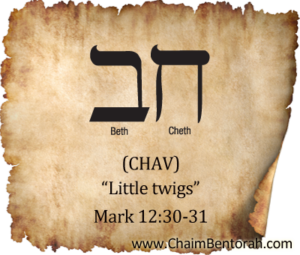QUICK WORD STUDY – LITTLE TWIGS – CHAV – חב Cheth Beth
Mark 12:30-31, “And thou shalt love the Lord thy God with all thy heart, and with all thy soul, and with all thy mind, and with all thy strength: this is the first commandment. And the second is like, namely this, Thou shalt love thy neighbor as thyself. There is none other commandment greater than these.”
 Jesus spoke these words in a Northern dialect of Aramaic. In the Aramaic text, the Pershitta the language that Jesus spoke, He uses two different words for love. Jesus was taking advantage of the broader language of Aramaic to express the ancient classical Hebrew word ahav (love). Jesus did not misquote the Old Testament commandments; he only used the broader Aramaic language to give a greater depth to its meanings. I mean this was really clever what Jesus did.
Jesus spoke these words in a Northern dialect of Aramaic. In the Aramaic text, the Pershitta the language that Jesus spoke, He uses two different words for love. Jesus was taking advantage of the broader language of Aramaic to express the ancient classical Hebrew word ahav (love). Jesus did not misquote the Old Testament commandments; he only used the broader Aramaic language to give a greater depth to its meanings. I mean this was really clever what Jesus did.
You see the scribes were really dealing with an age old question. If you ahav (love) God with all you heart, soul and mind, then how can you have the same love ahav for others. Logically, you must love others less than God if you give God such priority in you love. You cannot love God and man equally. In other words, is a man to love his wife and children more than God, equally as God or less than He loves God?
So when Jesus answered their question He addressed their concerns using two different Aramaic words for love. In reference to loving God with all your heart, Jesus used the word racham which is the word David used in Psalms 18:1 when he said he loved God. This is a love which is only possible with God. We are to love God like He loves us, only with God loving us it is used in an intensive form where we loving Him is used only in the Aramaic as a Pael similar to the Hebrew Qal, simple verbal form and in a Pael or Qal form racham love is a love that sort of like ahav the Hebrew word for love in a Piel (intensive form), Peal in Aramaic. So Jesus didn’t misquote the Old Testament, He only clarified it for the understanding of the scribes.
In regards to loving your neighbor Jesus used the Aramaic word chav which is your standard word for love similar to the Hebrew word ahav except you use a Chet rather than a Hei. A little play on words that a scribe would quickly pick up on. Chav is spelled Chet, Beth which is a Semitic root word found in most of your ancient Semitic languages. It has its origins in a stick burning in a fire. Chav has been used for a stick and/or for kindling. In other words chav is a kindling love. Any good Boy Scout will tell you that kindling is used to start a fire.
When I was a city breed camp director I used to try to start a camp fire with my city breed counselors. We would pile up a bunch of thick logs, douse it with a gallon of gasoline, stand a block away while one brave volunteer tosses a torch into the pile and then we would run for our lives. The fire would blaze beautifully until all the gasoline burned off and then it would die out. The next summer the camp owners gave me a nature expert, a guy who was an Eagle Scout. I gratefully assigned him the task of building our camp fire. I told him where we stored the logs, gasoline and torches, but he said, “I will lite it with one match without using any of your supplies.” He took a group of campers (we called them residents) on a field trip to the forest where they gathered a supply of little twigs and dead tree branches in increasing sizes. He then put these branches and twigs into a pile with the smallest twigs in an opening at the bottom of the pile which he called kindling. With one match he lit the small, barely noticeable twigs or his kindling and as the kindling burned it heated the branches of the next size up long enough so they would catch fire heating up the next largest branches until you had a roaring camp fire that lasted almost through the night. All started from some little chav (twigs, kindling).
You see to love God is easy, because He already loves us; we just need to return that love. Ah, but to love your neighbor, that is not so easy. They often do not love you to begin with and that is why Jesus uses the word chav and not racham with your neighbor. You need to love your neighbor when they do not love you. If you persist in loving your neighbor, even when they resist your love, you will be like those little twigs that keep warming up that bigger branch, even to the point where they are totally exhausted. Yet, those twigs will warm up those bigger branches to the point where they will catch fire and begin warming up larger branches. Where there is no love among your neighbors, God has called you to be the chav the kindling to start a bonfire of love in your neighborhood.







Soo good!.. Keep ’em coming!.. I can’t express how much these Totally Bless me!
Brilliant.
Thank you
(What is the difference between the intensive form and simple?)